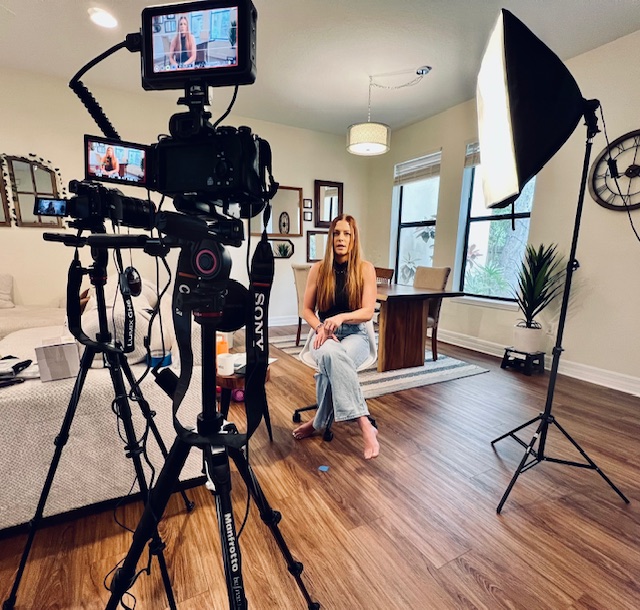Emma Pranger
INQ 100
Dr. Knutson
12/3/19
I met Melissa Williams on a freezing November morning, as she led me through a maze of hallways to her office in the Rape and Abuse Crisis Center. As I walked in, I noticed the neatly arranged pictures on the corkboard behind the computer, the arrays of neatly stacked binders, and the well-maintained pencil cup, and felt a pang of guilt for the mess that was my workspace back home. Just as I was about to comment on the nature of her office she apologized for the mess, as she had only taken the job a few months prior and had yet to get organized. Capable and driven as this remark might suggest, it is Ms. Williams’ compassion that truly makes her remarkable. The story she told me is a testament to her resilience, her commitment to her profession, and the kindness she brings into her interactions with others. These characteristics are both caused by underlying factors in her life, and by her natural character.
Melissa Williams is the prevention education supervisor at the Rape and Abuse Crisis Center in Fargo, North Dakota. Williams is deeply passionate about her vocation. When speaking about her current role at the Rape and Abuse Crisis Center, she stated: “I get to be the person that gets people to talk about things that need to be talked about. I love that challenge every single day and I love creating new challenges like that for the purpose of educating people to become better humans” (Williams).
Ms. Williams grew up in a stable, two parent home with her two older sisters. She spent her early youth in Fargo, North Dakota, until she moved to Linton, North Dakota at age nine. During her youth, she was “very active”, participating in “a lot of sports”, and “focused a lot on school” (Williams). Overall, Ms. Williams believes she is “very fortunate in the upbringing that [she] had as a child” (Williams). However, it was not without challenges. After moving to Linton, Ms. Williams became the target of peer bullying. She attributed her experience partly to the dynamics of being the “new kid” in a small community (Williams). Additionally, because of the school’s small size, she couldn’t avoid her bullies. She stated: “If I was struggling with someone I played a sport with I had to be their teammate every single day” (Williams). Ms. Williams’ experiences are consistent with observed patterns of bullying in small, midwestern schools. These are characterized by victimizing “new kids” and by victims having difficulties avoiding bullies (Oliver et al. 418).
Ms. Williams’ experiences with bullying caused her to develop coping mechanisms. She developed a “protective mode”, where she would defensively lash out at others. She explained: “I kind of had this wall of like, I have to protect myself, and so part of that was being mean back to them… or kind of having an attitude because that was how I protected myself” (Williams). For Ms. Williams, it became difficult to confine this defensive attitude to her interactions with her bullies. Her tone with her family at home became uncharacteristically aggressive and irritable, as she struggled to shut off her “protection mode” when she was safe at home (Williams).
However, despite these tendencies, Ms. Williams’ remained a warm and caring person. Her kind personality caused her to gain the acceptance of many of her peers, as evidenced by her selection as prom queen her senior year, an experience she describes as “very special”, because it served as evidence of this acceptance (Williams). Mrs. Williams’ generally friendly and non-judgmental attitude can be partly explained as a method for coping with bullying. Tennant et al. showed that victimized children who in turn participate in bullying behavior have higher levels of depression and anxiety, and are prone to low self-esteem. On the other hand, victims who engage in mostly defender-type behavior (this encompasses direct intervention in observed bullying, but extends to reaching out to others, and being present for those in need) have lower levels of depression and anxiety, and have higher self-esteem (5). Ms. Williams’ commitment to helping others, in addition to being a manifestation of her caring nature, may have served as a coping mechanism for her own trauma.
Ms. Williams moved to Moorhead when she graduated high school to continue her education at MSUM. The bullying behavior that she had experienced in high school ended with the transition, as she was able to take advantage of the larger pool of peers to avoid negative individuals. She explained: “in college if I didn’t like someone, I didn’t have to be around them if I didn’t want to, so I think there was more flexibility in where I spent my time and who I spent my time with” (Williams). However, some of the psychological effects of bullying persisted. Ms. Williams became “self-conscious about [her] personality” (Williams). In her head, Ms. Williams noted, she was still “very sure of who [she] was”; an “independent… blunt, assertive person” (Williams). However, she was “very filtered” and about how she spoke, and carefully managed how she would be perceived by others (Williams). Existing literature on bullying indicates that the psychological effects of bullying are long-lasting, commonly continuing until late adolescence/early adulthood (Arseneault et al. 722). This filtering behavior might be attributed to tempering behavior that could lead to social backlash from peers, in an effort to avoid further victimization.
Despite these psychological remnants of her prior experiences, college was a generally positive experience for Ms. Williams. It allowed her to become more self-assured, and to recognize that she is a “mature, independent person” and that she could “really depend” on herself (Williams). During this time, she also “ learned… how to be a good friend” (Williams). She attributes this largely to her prior experience with bullying. She explained: “Because of those experiences I had growing up I was like “I will never be these people.” I will never make someone feel the way I felt, and so I was really purposeful about my friendships coming first in my life” (Williams). This reaction to victimization categorizes Ms. Williams as a victim-defender, an attitude which might be best explained by her natural tendencies toward compassionate and understanding action.
College also allowed Ms. Williams to further develop her interest in social work. Academically, the collegiate setting offered more opportunities for hands-on work. There were “recommended hours for social work that you needed to do at different places” (Williams). Ms. Williams completed these hours at Planned Parenthood, the Juvenile Detention Center, and interned at Centre, Inc. These hours were so valuable to Ms. Williams because “nothing can compare to interning and being out in the field” (Williams). She explained: “it’s like I learned more interning for six months than I did in, like, the four years of schooling. Because it’s so different to talk about it and study it and learn it than you’re one-on-one with a client now, what are you going to do?” (Williams). In addition to new academic challenges, the new social environment in college allowed Ms. Williams to explore her passion for social work. The larger peer group in college allowed her to “find more like-minded people… because you can kind of pick and choose who you want to spend your time with” (Williams). The importance she chose to place on maintaining friendships also allowed her to affirm her passion for social work. She explained: “even people that I just met or just knew came to me… for help and so that helped me understand again more specifically what I wanted to do with my life in terms of social work” (Williams).
Although Ms. Williams knew when she left college that she wanted to go into social work, it was not entirely clear to her what area of social work she would pursue. Her first job when she left college was at Prairie St. Johns, where she ran the intense outpatient program for chemically dependent patients. A new college graduate, the responsibility of her new role was “really intimidating” (Williams). But rather than discouraging her, the pressure “helped [her] immensely to become more confident” in herself (Williams). After running the program for a few years, she received a recommendation from a friend to work at PATH, a treatment/foster care facility. She worked there for two and a half years, and “really enjoyed” the work (Williams). The switch was helpful for her because it allowed her to keep applying herself in new ways and learning new things. It was for this same reason that she ultimately left PATH, instead choosing to work with the North Dakota state government to coordinate statewide prevention plans and responses to human trafficking. She said working in a role of such authority helped her “learn an immense amount, not only about work and social work, but also just who [she] is” (Williams). Ultimately, she left that position for her current one because of her leadership position and the healthy workplace environment at the RACC.
Social work, however, is not without its risks. Working with victims of traumatic crime has mental health related ramifications, including susceptibility to compassion fatigue. Compassion fatigue, also referred to as secondary traumatic stress disorder (STSD), is a “set of observable reactions to working with people who have been traumatized” similar in nature to those exhibited by patients with post traumatic stress disorder (Administration for Children and Families). Left untreated, compassion fatigue can result in “problems with mental and physical health…and poor work performance” (Administration for Children and Families). Additionally, as individuals with STSD relate their secondary trauma to members of their support networks, they can unintentionally transmit this trauma to those closest to them, thus severely straining social relationships (Salston and Figley, 169). In the interview, Ms. Williams indicated her ongoing efforts to combat compassion fatigue in her life, asserting that while she “can take on a lot” and thus “[doesn’t] experience that a whole lot”, she must still remain vigilant of signs of compassion fatigue and practice healthy self-care, given that “you could spiral real fast if you don’t take care of yourself”(Williams).
Despite these struggles, Ms. Williams (and others vulnerable to STSD) are still able to find gratification in their work. While discussing her involvement in the anti-human trafficking campaign, Ms. Williams described her field work as follows: “The clientele in trafficking is and was and will be the hardest population I have worked with. And that’s only because of the complex trauma the amount of trauma that they’ve experienced… they’re my favorite population to work with, but by far the most challenging” (Williams). Ms. William’s ability to derive gratification out of working with challenging clients is a prime example of compassion satisfaction. Compassion satisfaction is defined as the “positive outcome from working with challenging patients” (Cetrano et al. 2). A number of factors can cause individuals to experience compassion satisfaction. One study of female psychologists working with sexual assault survivors found that 45% of participants reported enjoyable aspects of working with this traumatized population. The most common positive aspects reported were witnessing “client resiliency and personal growth”, and “a sense of importance of the services provided” (Schauben and Frazier, 51). Despite the emotionally strenuous nature of working with extremely traumatized populations, a significant number of social workers are still able to sustain compassion satisfaction.
Ms. Williams is partly able to avoid compassion fatigue by framing her efforts to avoid burnout through the lens of her clients. She stated: “What I always remind people is that you are doing a disservice to the people you work with if you don’t put yourself first. Because if your mental health is struggling or you’re experiencing compassion fatigue or secondary trauma, your clients are going to feel that” (Williams). This is a mechanism used to overcome her tendencies to avoid taking time for self-care because she sees herself as less deserving of her own attention than her clients. She stated: “That’s another piece for me to learn, that’s hard for me to learn… is how do you put yourself first? …when you’re in a profession that is constantly giving, how do you give to yourself first” (Williams). This frame directly subverts this line of thinking by emphasizing the client’s wellbeing.
A number of environment factors also help Ms. Williams to experience compassion satisfaction in her current work. Research suggests that a key factor in reducing compassion fatigue and increasing compassion satisfaction is the quality of work and of the workplace environment (Cetrano et al. 8). Work intrusion on other areas of life is correlated with higher risk of compassion fatigue. When asked about her ability to separate her work and home lives, Ms. Williams responded that she is “pretty good at keeping it in check” (Williams). On the other hand, positive and supportive workplace culture and employee engagement has been found to correlate with higher levels of compassion satisfaction. Ms. Williams spoke highly of the Rape and Abuse Crisis Center. She said that what originally drew her to work in the center was that “the culture [t]here is so healthy” (Williams). According to Ms. Williams, the workplace at the RACC is characterized by “communication and consistency”, a staff which is “helpful and supporting of each other”, and an unwavering focus on the needs of the client. The healthy environment at the RACC is likely a contributing factor for Ms. William’s ability to derive compassion satisfaction from her work.
Ms. Williams’ spiritual beliefs may also help her to experience compassion satisfaction. Though her beliefs are not based in any major religious sect, she stated that she “certainly believe[s] in a higher power.” She believes in the concept that a person’s energy “cannot be dissipated”, and that the soul regenerates into a new life when the current one ends, taking with some of the lessons from this life. She also has faith in the idea that “things are put in [her] path because they’re supposed to be there” and that her soul has an overarching purpose in this life. According to Schauben and Frazier, spiritual beliefs can function as a form of coping mechanism for those at risk for compassion fatigue (52). This does not mean that Ms. Williams’ spiritual beliefs were constructed as part of a coping mechanism, merely that they may have some utility in this manner. Specifically, the idea that her soul was placed onto earth with a specific purpose helps to understand her deeply rooted conviction in her work.
Although much of this paper has been devoted to explaining how theoretical and external factors have influenced Ms. Williams’ experiences and attitudes, the role of character is also of importance, both in Ms. William’s choice to be a social worker, and also in her ability to derive compassion satisfaction from this work. Ms. Williams knew from a young age that she wanted to go into social work. Growing up, she was “always very open-minded…open to new perspectives and ideas and helping people no matter where they come from” (Williams). When she was in high school, she “always loved helping people and listening” and “always gravitated towards the hard topics… where other people were like ‘I can’t that’s too much for me’” (Williams). This compassion and drive to help others is a natural aspect of Ms. Williams’ character. And although there are aspects of Ms. Williams’ work environment that make coping with the stresses of her work more manageable, the joy and meaning that she derives from her work cannot be explained by theories. Her attitudes towards her work can be seen in the following quotation:
“You see the best and the worst in the world. Everyday. And it’s humbling, it makes you grateful for life, your life, and it makes you take a step back and look at the world. It has helped make me a better person. I am the most open-minded, non-judgmental person in the world and I love that about myself. It has helped me accept others for who they are no matter who they are or what things they have done, and I feel like people feel that from me… I want everyone to feel wanted” (Williams).
A supportive work environment, capacity to separate work from life, spirituality, and responses to childhood bullying have all played a role in making Ms. Williams capable of deriving meaning and gratification from work that can be challenging and distressing. The role of Ms. William’s character, however, cannot be overlooked. From a young age, Ms. Williams decided to dedicate her life to her profession and carry out that profession with great care. Her dedication to helping others is admirable and something everyone should aspire to.
Works Cited
Administration for Children and Families. Secondary Traumatic Stress, https://www.acf.hhs.gov/ trauma-toolkit/secondary-traumatic-stress
Arseneault, Louise, et al. “Bullying victimization in youths and mental health problems: ‘Much ado about nothing’?” Psychological Medicine, vol. 40, no. 5, 2010, pp. 717–729. Cambridge University Press, doi:10.1017/S0033291709991383
Cetrano, Gaia, et al. “How are Compassion Fatigue, Burnout, and Compassion Satisfaction Affected by Quality of Working Life? Findings from a Survey of Mental Health Staff in Italy.” BMC Health Services Research, vol. 17, no. 755, Nov. 2017, pp. 1-11. SpringerLink, doi:10.1186/s12913-017-2726-x
Salston, MaryDale, and Charles R. Figley. “Secondary Traumatic Stress Effects of Working with Survivors of Criminal Victimization.” Journal of Traumatic Stress, vol. 16, no. 2, Apr. 2003, pp. 167-74. EBSCO, doi:10.1023/A:1022899207206
Tennant, Jaclyn E. et al. “Internalizing Problems of Youth Involved in Bullying via Different Participant Role Combinations and Gender.” School Psychology Review, vol. 48, no. 3, Sep. 2019, pp. 222-36. EBSCO, doi:10.17105/SPR-2017-0078.V48-3
Oliver, Ronald et al. “The Perceived Roles of Bullying in Small-Town Midwestern Schools.” Journal of Counseling and Development, vol. 72, no. 4, Mar. 1994, pp. 416-420. EBSCO, doi:10.1002/j.1556-6676.1994.tb00960.x
Schauben, Laura J., and Patricia A. Frazier. “Vicarious Trauma: The Effects on Female Counselors of Working with Sexual Violence Survivors.” Psychology of Women Quarterly, vol. 19, no. 1, Mar. 1995, pp. 49-64. SAGE, journals-sagepub-com.cordproxy.mnpals.net/doi/pdf/10.1111/j.1471-6402.1995.tb00278.x





Recent Comments